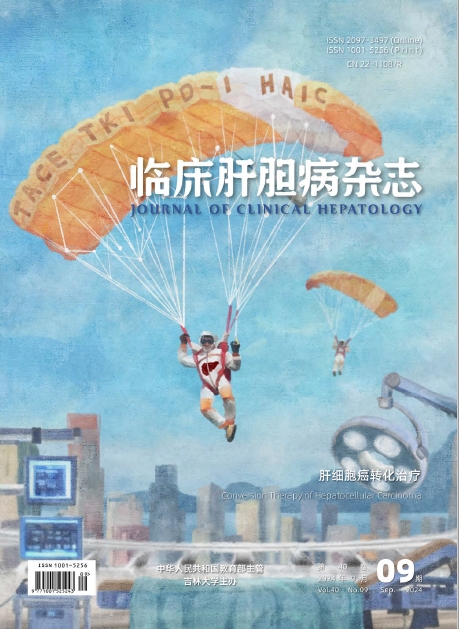| [1] |
HYUN MH, LEE YS, KIM JH, et al. Hepatic resection compared to chemoembolization in intermediate- to advanced-stage hepatocellular carcinoma: A meta-analysis of high-quality studies[J]. Hepatology, 2018, 68( 3): 977- 993. DOI: 10.1002/hep.29883. |
| [2] |
Professional Committee for Prevention and Control of Hepatobiliary and Pancreatic Diseases of Chinese Preventive Medicine Association, Chinese Society of Liver Cancer, Liver Study Group of Surgery Committee of Beijing Medical Association, et al. Chinese expert consensus on conversion therapy of immune checkpoint inhibitors combined antiangiogenic targeted drugs for advanced hepatocellular carcinoma(2021 Edition)[J]. Chin J Hepatobiliary Surg, 2021, 27( 4): 241- 251. DOI: 10.3760/cma.j.cn113884-20210415-00138. |
| [3] |
|
| [4] |
Alliance of Liver Cancer Conversion Therapy, Committee of Liver Cancer, China Anti‐Cancer Association. Chinese expert consensus on conversion and perioperative therapy of primary liver cancer(2024 edition)[J]. Chin J Dig Surg, 2024, 23( 4): 492- 513. DOI: 10.3760/cma.j.cn115610-20240228-00135. |
| [5] |
LI XR, LI JF, ZHANG WW, et al. Long-term efficacy of sequential surgery after immune combined with targeted therapy for initially unresectable hepatocellular carcinoma[J]. Chin J Hepatobiliary Surg, 2024, 30( 1): 9- 14. DOI: 10.3760/cma.j.cn113884-20231130-00147. |
| [6] |
ZHU XD, HUANG C, SHEN YH, et al. Hepatectomy after conversion therapy using tyrosine kinase inhibitors plus anti-PD-1 antibody therapy for patients with unresectable hepatocellular carcinoma[J]. Ann Surg Oncol, 2023, 30( 5): 2782- 2790. DOI: 10.1245/s10434-022-12530-z. |
| [7] |
CHENG AL, HSU C, CHAN SL, et al. Challenges of combination therapy with immune checkpoint inhibitors for hepatocellular carcinoma[J]. J Hepatol, 2020, 72( 2): 307- 319. DOI: 10.1016/j.jhep.2019.09.025. |
| [8] |
ZHANG WW, TONG S, HU BY, et al. Lenvatinib plus anti-PD-1 antibodies as conversion therapy for patients with unresectable intermediate-advanced hepatocellular carcinoma: A single-arm, phase II trial[J]. J Immunother Cancer, 2023, 11( 9): e007366. DOI: 10.1136/jitc-2023-007366. |
| [9] |
XU B, DONG SY, BAI XL, et al. Tumor radiomic features on pretreatment MRI to predict response to lenvatinib plus an anti-PD-1 antibody in advanced hepatocellular carcinoma: A multicenter study[J]. Liver Cancer, 2023, 12( 3): 262- 276. DOI: 10.1159/000528034. |
| [10] |
LI JF, YUAN J, ZHANG WW, et al. Value of the ratio of viable tumor cells in the prognostic evaluation for patients with unresectable hepatocellular carcinoma undergoing sequential surgery after conversional therapy[J]. Chin J Hepatobiliary Surg, 2024, 30( 4): 241- 247. DOI: 10.3760/cma.j.cn113884-20240226-00056. |
| [11] |
RAN ZK, TANG HW, CAO YB, et al. A retrospective study of postoperative adjuvant therapy following immunotherapy combined with targeted therapy and sequential curative surgical procedures for initially unresectable hepatocellular carcinoma[J]. Chin J Surg, 2024, 62( 6): 543- 548. DOI: 10.3760/cma.j.cn112139-20240207-00068. |
| [12] |
GAO YN, YOU MJ, FU JL, et al. Intratumoral stem-like CCR4 + regulatory T cells orchestrate the immunosuppressive microenvironment in HCC associated with hepatitis B[J]. J Hepatol, 2022, 76( 1): 148- 159. DOI: 10.1016/j.jhep.2021.08.029. |







 DownLoad:
DownLoad: